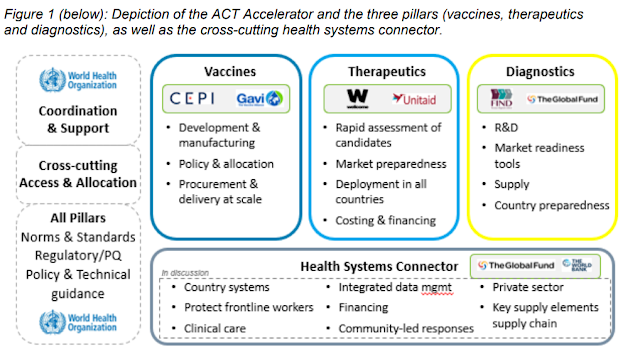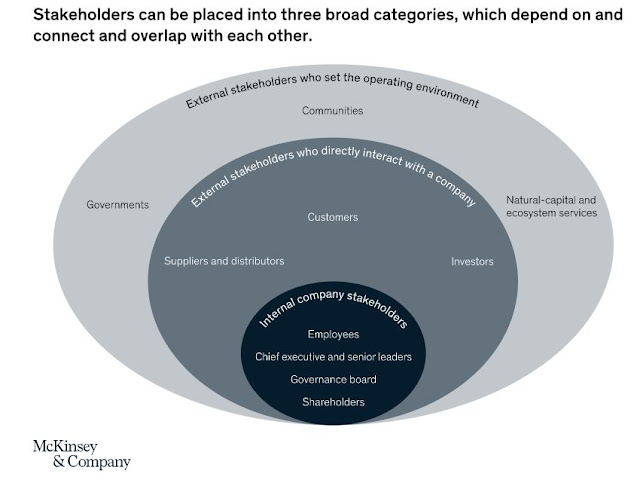What is stakeholder capitalism & how does big tech, COVAX, WHO, and UN play a role in coordinating to expand globalism.
76 countries, including Japan, Germany and Norway, have now signed up to the COVAX scheme. The COVAX initiative aims to “accelerate the development and manufacture of COVID-19 vaccines, and to guarantee fair and equitable access for every country in the world”. That, again, sounds wonderful, especially given the staggering inequalities in vaccination levels between rich and developing countries.
But why is the World Health Organization (WHO), which is part of the UN, not calling the shots? “Countries together, through multilateral agencies like the WHO, were supposed to make decisions about global health issues, with maybe some technical support by others,” says Sulakshana Nandi from NGO People's Health Movement, which has recently brought out a Policy Brief on COVAX.
Big Pharma investment opportunities
COVAX was set up as a multi-stakeholder group by two other multi-stakeholder groups, GAVI (the Vaccine Alliance) and CEPI (the Coalition for Epidemic Preparedness Innovations), in partnership with the WHO. Both GAVI and CEPI have strong ties with the World Economic Forum (which was one of the founders of CEPI) as well as the Bill and Melinda Gates Foundation, and both are also connected to companies like Pfizer, GlaxoSmithKline, AstraZeneca and Johnson & Johnson through manufacturer partnerships (GAVI) or as 'supporters' (CEPI). Even though COVAX is funded predominantly by governments, it is these corporate-centered coalitions that are overseeing its roll-out.
The contrast between the multi-stakeholder approach and a 'classic' multilateral one came to the surface when South Africa and India proposed the so-called TRIPS waiver at the end of last year. They requested a temporary lifting of intellectual property rules on all COVID-19 technologies in order to boost the manufacturing and distribution of vaccines and other essential medical products in mainly developing countries. WHO director-general Tedros Adhanom Ghebreyesus said in a speech that he backed the proposal. “But GAVI, the Bill and Melinda Gates Foundation – even Bill Gates himself – and Big Pharma opposed this proposal very strongly,” said Nandi. “It's more important for them to protect their interests and market mechanisms than to protect universal health or protect people from COVID.” The WHO was approached for comment but has not replied.
Again, there is a stark choice between a human rights-led approach carried out by the UN and a profit-led approach carried out by multistakeholder bodies representing the interests of corporations. In the case of COVAX – which is failing to meet its modest aim of vaccinating 20% of the populations of low- and middle-income countries – the former has won out.
Something fishy really is going on in the realm of global governance. If you value your right to public health, to privacy, to access healthy food or to democratic representation, be wary of the words 'stakeholder capitalism’ when they pop up at the next Davos summit.
Big tech governing big tech
Another landmark in the development of stakeholder capitalism can be found in the Big Tech sector. As a part of his 2020 Roadmap for Digital Cooperation, the UN Secretary-General called for the formation of a new ‘strategic and empowered multi-stakeholder high-level body’. Again it's not easy to find a list of stakeholders but after some digging a long list of ‘roundtable participants’ for the roadmap includes Facebook, Google, Microsoft and the WEF.
Although the functions laid out for this new body are quite vague, civil society organizations fear it will come down to Big Tech creating a global body to govern itself. This risks institutionalizing these companies' resistance against effective regulation both globally and nationally and increasing their power over governments and multilateral organizations. If the body comes to fruition, it could be a decisive victory in the ongoing war GAFAM (Google, Apple, Facebook, Amazon, and Microsoft) is waging with governments over tax evasion, antitrust rules, and their ever-expanding power over society.
More than 170 civil society groups worldwide have signed another open letter to the secretary-general of the UN – this time to prevent the digital governance body from forming. The secretary-general was approached for comment but had not replied at the time of publication. Here is the full article.
Stakeholder Capitalism by McKinsey
The McKinsey Global Institute concluded that those with a long-term view—something that is essential to stakeholder capitalism—outperformed the rest in earnings, revenue, investment, and job growth. Other McKinsey research found that companies with strong environmental, social, and governance (ESG) norms recorded higher performance and credit ratings; other research has found that such companies perform better during crises.











